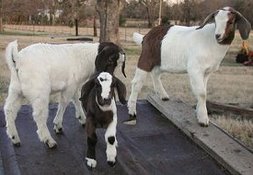NST Online » Local News
2007/08/24
Meaty returns for breeders
By : Azira Shaharuddin
Email to friend Print article
2007/08/24
Meaty returns for breeders
By : Azira Shaharuddin
Email to friend Print article

The Boer goats adapting well to their new home at the Highland Organic Boer Farm in Tapah.
TAPAH: Things are looking promising for Majestic Nature Boer Farm.Set up last year to meet the high demand for goat meat, the company also has a farm in Chenderiang managed by its subsidiary Highland Organic Boer Farm.
It began with 1,000 females, also known as does, and 30 males, and has now grown to 2,200 breeding heads.The company intends to set up another four Boer goat farms — one each year beginning next year.The Third National Agriculture Policy and the National Goat Policy aim to achieve a goat population of 4.96 million heads with 1.99 million heads of breeding does by 2015.Majestic Nature Boer Farm aims to be the largest Boer goat breeder and meat provider for the country.
TAPAH: Things are looking promising for Majestic Nature Boer Farm.Set up last year to meet the high demand for goat meat, the company also has a farm in Chenderiang managed by its subsidiary Highland Organic Boer Farm.
It began with 1,000 females, also known as does, and 30 males, and has now grown to 2,200 breeding heads.The company intends to set up another four Boer goat farms — one each year beginning next year.The Third National Agriculture Policy and the National Goat Policy aim to achieve a goat population of 4.96 million heads with 1.99 million heads of breeding does by 2015.Majestic Nature Boer Farm aims to be the largest Boer goat breeder and meat provider for the country.
Its second farm is scheduled to open next year in Chenderiang.Boer goats, which originated from Africa, can live in high temperatures, are resistant to disease, grow faster, breed all year round and have high fertility rates.Boer goats have thicker bones and more meat than other goats.Managing director Yeow Joo Kwang. said goat meat was healthier than other meats. The company imported the Boer goats from Australia. It also imported goat semen for artificial insemination."It is cheaper to import semen than buy a male goat. Through this, the quality is guaranteed as there would be no in-breeding."After eight months, the male goats would be sold to other farms or slaughtered. At the moment, only bucks are slaughtered for meat as the company wants to keep the does for breeding. They are bred without the use of hormones and only eat Napier grass grown across the farm. The water for the goats is taken from the nearby Lata Kinjang waterfall.Yeow said the company would open a research centre by September next year.He said each farm required an investment of about RM5 million, with the entire operation for five farms, feed mills, sales outlets and a slaughter and packaging plant expected to cost RM35 million.But the gains are expected to far outweigh the investment in as little as three years’ time."It’s a very lucrative business," said a smiling Yeow.

No comments:
Post a Comment